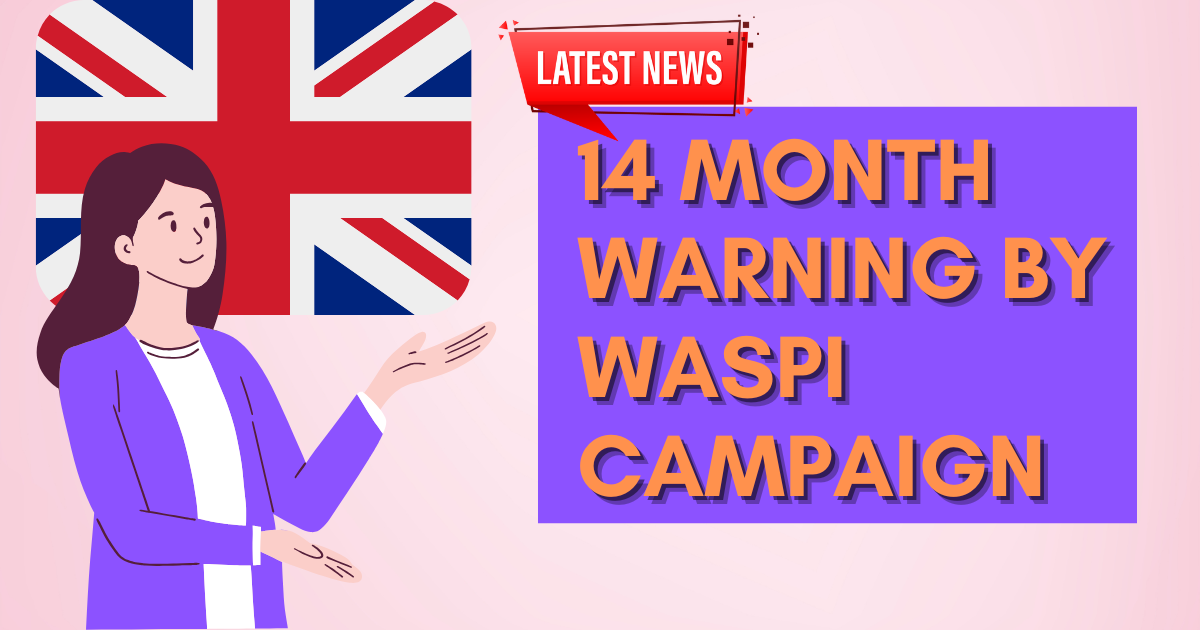14-Month Warning by WASPI Campaign: DWP Response and New Actions. The Women Against State Pension Inequality (WAPSI) campaign started because of the decision taken by the UK government to change the state pension age. The women argue that they were not provided adequate information about the changes and now DWP is not making any decision in favour of those women who faced challenges due to this change. If you’d like to know more about the topic ’14-Month Warning by WASPI Campaign’, please keep reading the blog.
14-Month Warning by WASPI Campaign
The Women Against State Pension Inequality (WASPI) campaign has been a voice for many women who were affected by the government’s sudden decision to increase the state pension age. Women argued in this campaign that they were not provided adequate information about the changes and now DWP is not making any decision in favour of those women who faced financial and emotional challenges due to this change. Several women were forced to work longer than expected or faced financial challenges due to the sudden changes in policy.

Campaign chair Angela Madden said it could take 14 months for their case to get a final decision from a high court judge as they prepare a judicial review to challenge the government’s decision not to grant compensation to the WASPI generation of women. The women of the campaign have knocked on the gates of the court to hear their appeal. They still have some hope that the government will provide them compensation after seeing their financial and emotional condition. But they got no proper response from the government and DWP.
Looking at the time it took for that previous review to go through, Ms Madden said it could be 14 months for this one to be completed. She warned, “It’s not a quick process.” Explaining the work involved, the campaign chair said: “It will be peaks of work; there’s been quite a peak to get us to this stage; we are almost ready to file the papers.”
“There’s a lot of work that’s gone into that. Then there will be a bit of a lull, where we won’t hear anything for a few weeks. Then we’ll hear that it’s been put in front of a judge to consider, and then we’ll know whether we’ve got permission to proceed or not. Then there’ll be another long wait until a court date comes up.”
DWP Response and New Actions
The DWP and government took the decision of not paying compensation to WASPI women, as it will be unfair because most women knew about the changes in policy. To this response, the WASPI campaigners sent a letter to the DWP highlighting their fresh legal claim and demanding a response.
A government spokesperson said, “We do not comment on live litigation. We accept the Ombudsman’s finding of maladministration and have apologised for there being a 28-month delay in writing to 1950s-born women.”
“However, evidence showed only one in four people remembered reading and receiving letters that they weren’t expecting and that by 2006, 90% of 1950s-born women knew that the state pension age was changing.”
“The government cannot justify paying for a £10.5 billion compensation scheme at the expense of the taxpayer.”
Jane Cowley, a director of the WASPI campaign, met with the government ministers and described the meetings as “productive,” and she has hope that the government will issue a fair compensation soon. But the government clearly stated no to the compensation, which made WASPI women more angry, as many of them are facing a critical time. Many women lost out on years of pension payments they thought they would receive. Several women were forced to work longer than anticipated or faced economic challenges.
Ombudsman Report
The Ombudsman report: The Department for Work and Pensions (DWP) was investigated by the parliamentary and Health Service Ombudsman for improperly managing the state pension age adjustments for women born in the 1950s. According to the report, the government did not provide a proper warning that must be given at least 28 months about the changes in the pension age from 60 to 65 and later to 66. This resulted in the recommendation of the Ombudsman that every woman must be given an amount between £1,000 and £2,950, according to the level of impact they experienced.
The head of the campaign said that this is a very lengthy process and might take up to 14 months. The legal processing has been started against the DWP by women.



